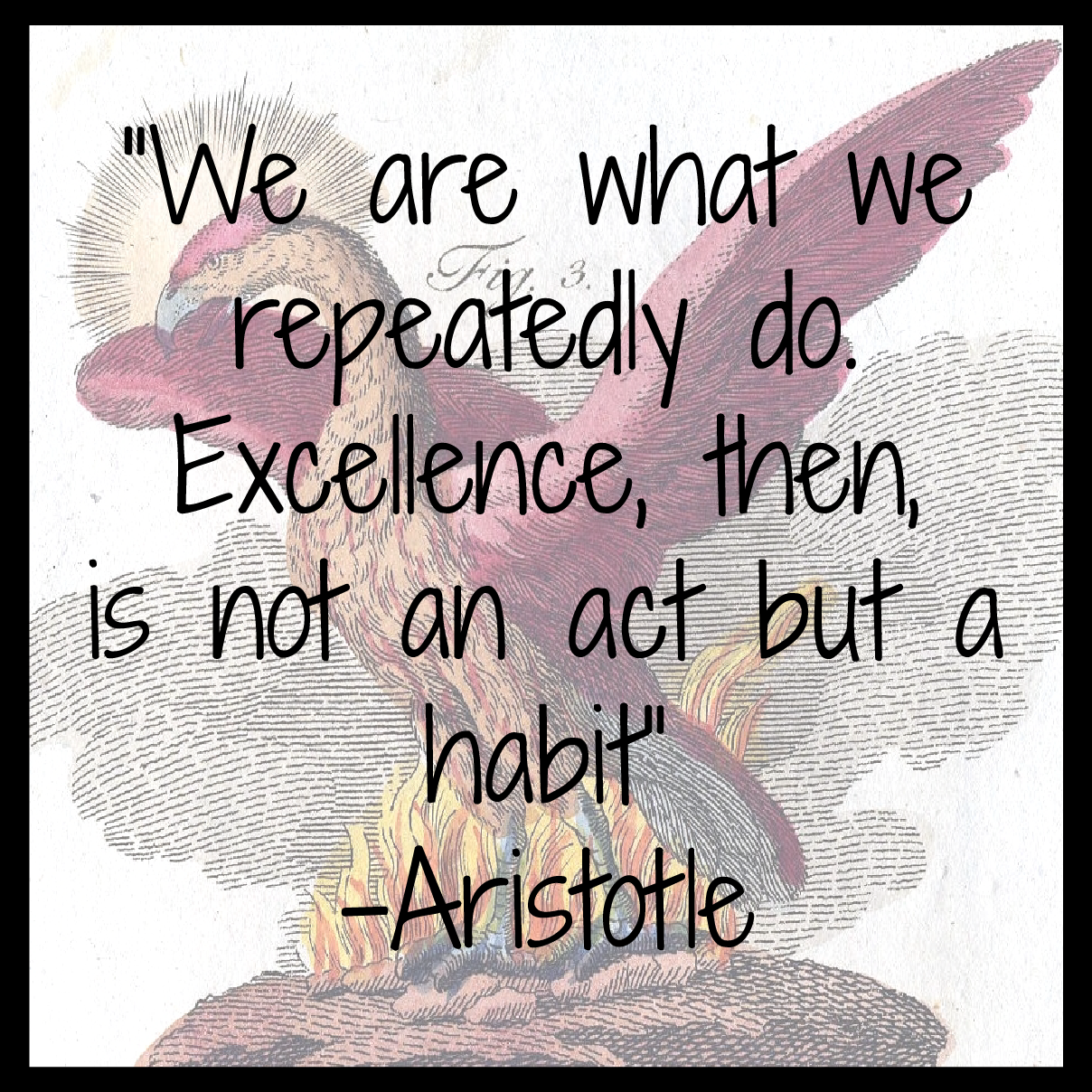It’s a new year, a new you. Right? Everyone sets New Year’s Resolutions at the start of January, but by the middle of the month, many of us run out of steam. My Saturday Morning Cartoon post from the beginning of the year included some helpful videos on how to improve your chances of sticking to your resolutions. Today I want to talk about goal-setting, in general, both from a scientific perspective (what’s going on in our brains) and a function perspective (how we can use research to achieve our goals).
Intrinsic Motivation
First things first, the goals you set must align with your values. Without delving too much into weight loss goals let’s use that as an example. Goals to lose weight that are driven by social pressure or well-meaning advice won’t last. Intrinsic motivation is essential. So it’s important that when you set goals you know why you’re setting them, why they’re important to you. If we stick with weight-loss for a moment, an intrinsic or internal motivator might be to alleviate the pressure on your joints and increase your mobility or improve your mood. Your goals should align with your values. If you hate the beach, losing weight to look good in a swimsuit doesn’t align with who you are and isn’t going to motivate you in the long-run. Intrinsic motivation makes goal-conforming behaviours, things we do to achieve our goals, feel like less of a chore. There’s nothing worse than doing something because you feel like you must and hating every second of it. You have to be honest about what’s important to you and plan your goals accordingly.
If you focus on your intrinsic motivation, your personal why, it takes the focus off the goal for a bit and focuses on the immediate positive improvements and benefits.
Visualize your goal and track your progress
It is important to know what it looks like when you achieve your goal. “Goal Visualization” is the process where to envision our objectives both physical and abstract.
“The easier a goal is to see, the closer it seems,”
– Rajesh Bagchi, Assistant Professor at Virginia Tech.
Researchers have found that we tend to respond well to a concrete representation of our progress, e.g. we respond better to a piggy bank filing than numbers in our online banking account. Other examples include a thermometer-like bar that fills up as you progress towards your goal, or even a drawing bar graph can provide an extra boost of motivation.
What seems to be really important though is seeing your progress, and “counting down” seems to be less effective than “counting up”. Researchers out of Virginia Tech who found out the information about how concrete tracking can help people achieve abstract goals also found similar results with physical goals. The research team conducted an experiment where participants were asked to maintain their grip on an apparatus for about two minutes. There were two groups: one group observed a stopwatch that counted down the seconds, and another group observed a bar that counted up to the ~2-minute mark. Participants who saw the bar filling were able to maintain their grip for longer than the participants who watched numbers count down on a clock. The latter scenario makes it far harder to visualize progress.
“Progress is important. When what is left to be filled in the bar is smaller than what has been filled, that is when the motivation happens.”
– Amar Cheema, Associate Professor at the University of Virginia
Be honest with yourself
Another important part of reaching your goal is to be honest with yourself about how you actually behave. “Progress-bias” is when you focus solely on your goal-conforming behaviours. While it’s great to be optimistic, progress bias can mean that you ignore your bad behaviours. If you ignore your bad behaviour too often, you trick yourself into thinking that you’re doing better than you are. The key is monitoring your behaviour. If you have financial goals, it means tracking not just your savings but your spending. If you have a writing goal, then it may involve not just tracking your word count for a day or week but tracking the also number of days you don’t write, which is particularly relevant if there is a deadline. Ironically, a lack of confidence in your ability can decrease progress bias, but don’t go out of your way to beat yourself.
Keep track of your behaviours both towards and away from your goal. If you can be honest about where you’re failing to meet your goals then you learn where you can make improvements.
Plan for success…but don’t juggle too many plates
Planning is vital to attaining our goals. Not only does it help with articulating them, but in forcing ourselves to think of the steps necessary to reach the goal. “Implementation intention” has proven to be a useful strategy for following goal-directed steps. Where goal intentions state that “I want to do X .” Implementation intention, developed by psychologist Peter Gollwitzer, states, “When this happens, I will do that.”
Goal Intention: I want to do {goal}.
Implementation Intention: “IF {scenario} THEN I will {behaviour}.”
An implementation intention is more concrete than an abstract goal. This works a muscleful strategy because we tend to work better and more reliably with specific goals or behaviours, and we work better when larger goals are broken into smaller subtasks. Developing implementation intentions involved quite a lot of planning.

Juggling too many goals can lead to everything falling apart. Image Credit: J. J. Grandville [Public domain], via Wikimedia Commons
Make sure that your goal is attainable when you factor in the rest of your life. More importantly as with implementation intentions, try to break the big goal into small steps, especially at the beginning. You want to ease yourself into a new set of goal-supporting behaviour, not overwhelm yourself with so many changes that after a fortnight you throw your hands up and say “Forget this!”
“We found that specific planning helped people who had a single goal on their to-do list, but not people with multiple goals,”
– Amy Dalton and Stephen Spiller
Use habit-formation to support your goals
The idea of implementation intention seems to flow nicely into the concept of habit formation. In fact, one of the cited benefits of this strategy is that it can lead to automation of goal-directed behaviour. I wrote a post a while back on how important habits and context can be for getting work done. And I’m a huge proponent of getting my ‘goals’ into my ‘habit list’ as quickly as possible. And not without reason.
Developing automatic habits can go a long way to helping us achieve our goals. From a neurological perspective, when you’re learning a new behaviour, you activate the parts of your brain involved in working memory and decision-making. As you repeat the actions over and over, they move around in your brain and go to an area called the sensory motor loop that runs on cues rather than goals or outcomes. Repetition is key to forming new habits. If you can get that inertia built up, the habit becomes ingrained and cemented. Our “habitual mind” functions outside of our awareness and once habits are set; they can become rather rigid and inflexible to change. While some habits are negative, harnessing our habit mind can be helpful in attaining our goals.
Our brains are believed to be involved in two types of decision-making processes: deliberative and automatic/habitual. Deliberative decision-making takes into consideration future consequences of actions towards a particular goal and involves planning. Habitual decision-making is focused on repeating successful actions without thinking about it. Having an initial cue for the habit is important. It’s what triggers our habitual behaviour. Sounds a bit like implementation intention doesn’t it? Interestingly, there is an overlap in the neurological machinery responsible for pursuing carefully planned goals and the parts of the brain responsible for engaging in habits.\
What’s great is that sometimes, even when life is stressful, we can lean on our habits as a source of stability. Stress can erode our self-control. It seems that stress hormones can shut down the areas of the brain responsible for goal-directed behaviours leaving us more likely to fall back on habits since these areas remain unaffected the hormones.
But, here’s the kicker, that lack of control and reliance on habits doesn’t always need to be a bad thing. We’ll lean on any habit we’ve got in our repertoire when we’re overstressed, both good and bad. Habits will persist when we’re too tired or overwhelmed to exercise our self-control. Researchers found that good habits will be applied during times of stress simply because they’re habits, and we don’t have to think about them.
Controlling ourselves might not be the key, rather building habits is the key. If you don’t have a lot of willlpower, then habits are even more important.

I learned quite a bit researching for this post, and I’m eager to put these ideas into practice. I hope you found this post useful too
Cheers,

Resources
University of Alberta. (2011, September 18). When it comes to pursuing your goals, let your unconscious be your guide. ScienceDaily. Retrieved January 8, 2016 from www.sciencedaily.com/releases/2011/08/110826192433.htm
Virginia Tech. (2011, August 17). Easy to visualize goal is powerful motivator to finish a race or a task. ScienceDaily. Retrieved January 8, 2016 from www.sciencedaily.com/releases/2011/08/110815143935.htm
University of Chicago Press Journals. (2012, May 16). When does planning interfere with achieving our goals?. ScienceDaily. Retrieved January 8, 2016 from www.sciencedaily.com/releases/2012/05/120516152448.htm
Dalton, A. N., & Spiller, S. A. (2012). Too much of a good thing: The benefits of implementation intentions depend on the number of goals. Journal of Consumer Research, 39(3), 600-614.
University of California – Riverside. (2011, August 18). Ambitious goals equals satisfaction. ScienceDaily. Retrieved January 8, 2016 from www.sciencedaily.com/releases/2011/08/110817175927.htm
University of Colorado at Boulder. (2014, December 16). When pursuing goals, people give more weight to progress than setbacks. ScienceDaily. Retrieved January 8, 2016 from www.sciencedaily.com/releases/2014/12/141216144113.htm
Society for Personality and Social Psychology. (2014, August 8). How we form habits, change existing ones. ScienceDaily. Retrieved January 8, 2016 from www.sciencedaily.com/releases/2014/08/140808111931.htm
University of Southern California. (2013, May 27). Healthy habits die hard: In times of stress, people lean on established routines — even healthy ones. ScienceDaily. Retrieved January 8, 2016 from www.sciencedaily.com/releases/2013/05/130527100620.htm
Kansas State University. (2015, January 28). How to make your New Year’s resolution last one year, not one month. ScienceDaily. Retrieved January 8, 2016 from www.sciencedaily.com/releases/2015/01/150128113607.htm
Association for Psychological Science. (2008, March 8). Profound Impact Of Our Unconscious On Reaching Goals Revealed. ScienceDaily. Retrieved January 8, 2016 from www.sciencedaily.com/releases/2008/03/080307110340.htm
New York University. (2011, March 24). Similarities found in brain activity for both habits and goals. ScienceDaily. Retrieved January 8, 2016 from www.sciencedaily.com/releases/2011/03/110323135618.htm
Ruhr-Universitaet-Bochum. (2012, July 25). Force of habit: Stress hormones switch off areas of the brain for goal-directed behaviour. ScienceDaily. Retrieved January 8, 2016 from www.sciencedaily.com/releases/2012/07/120725090042.htm

No Comments